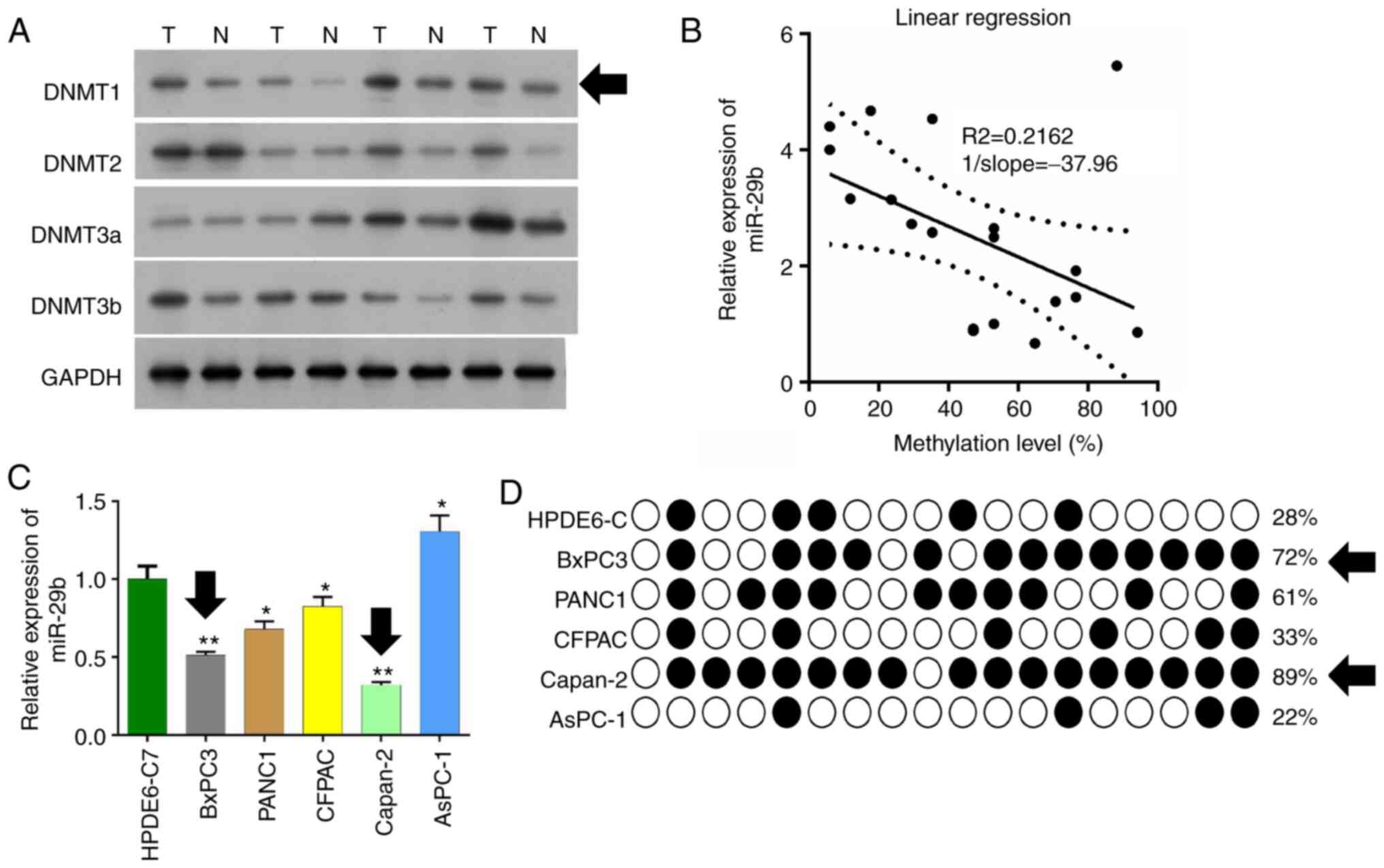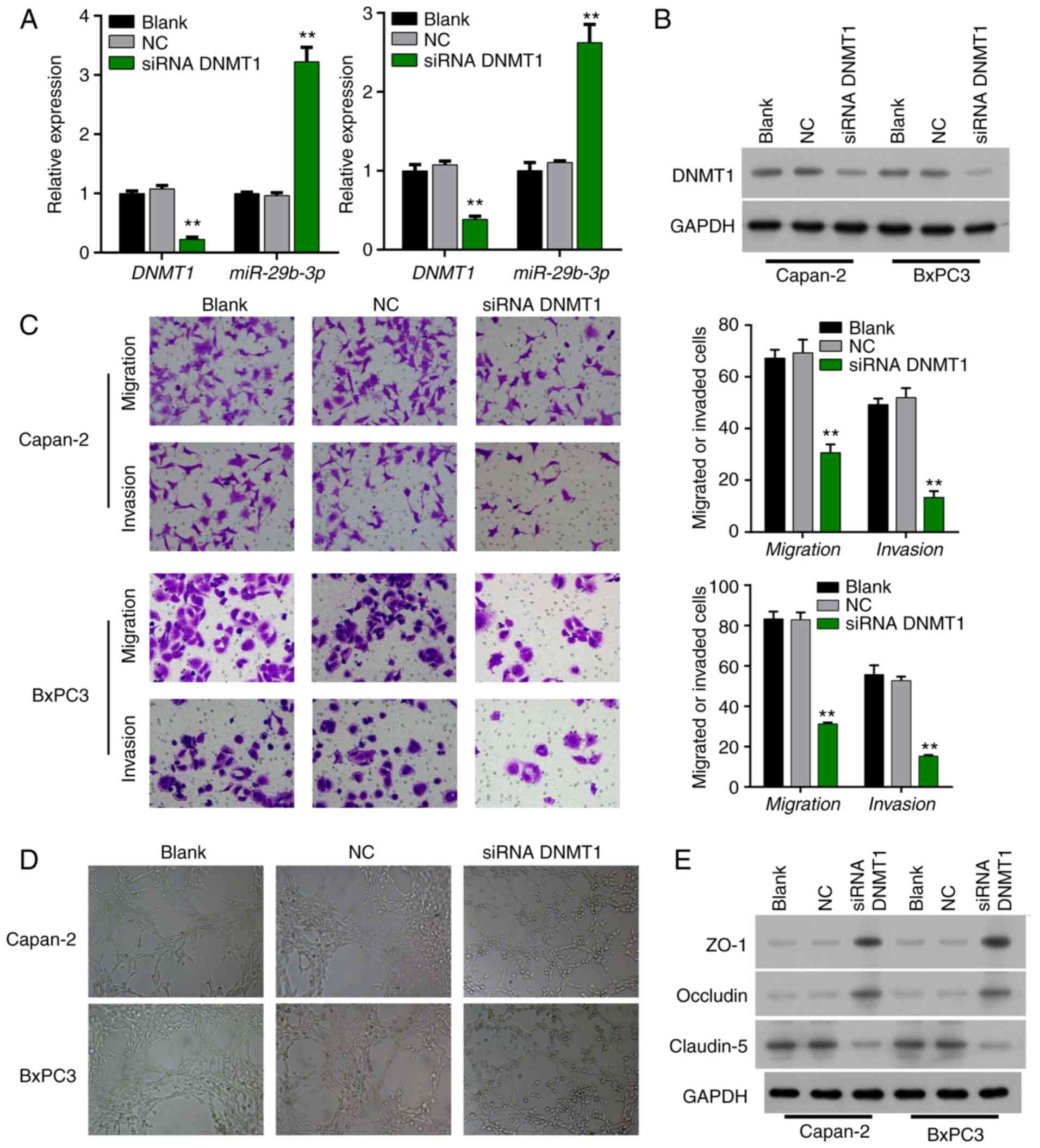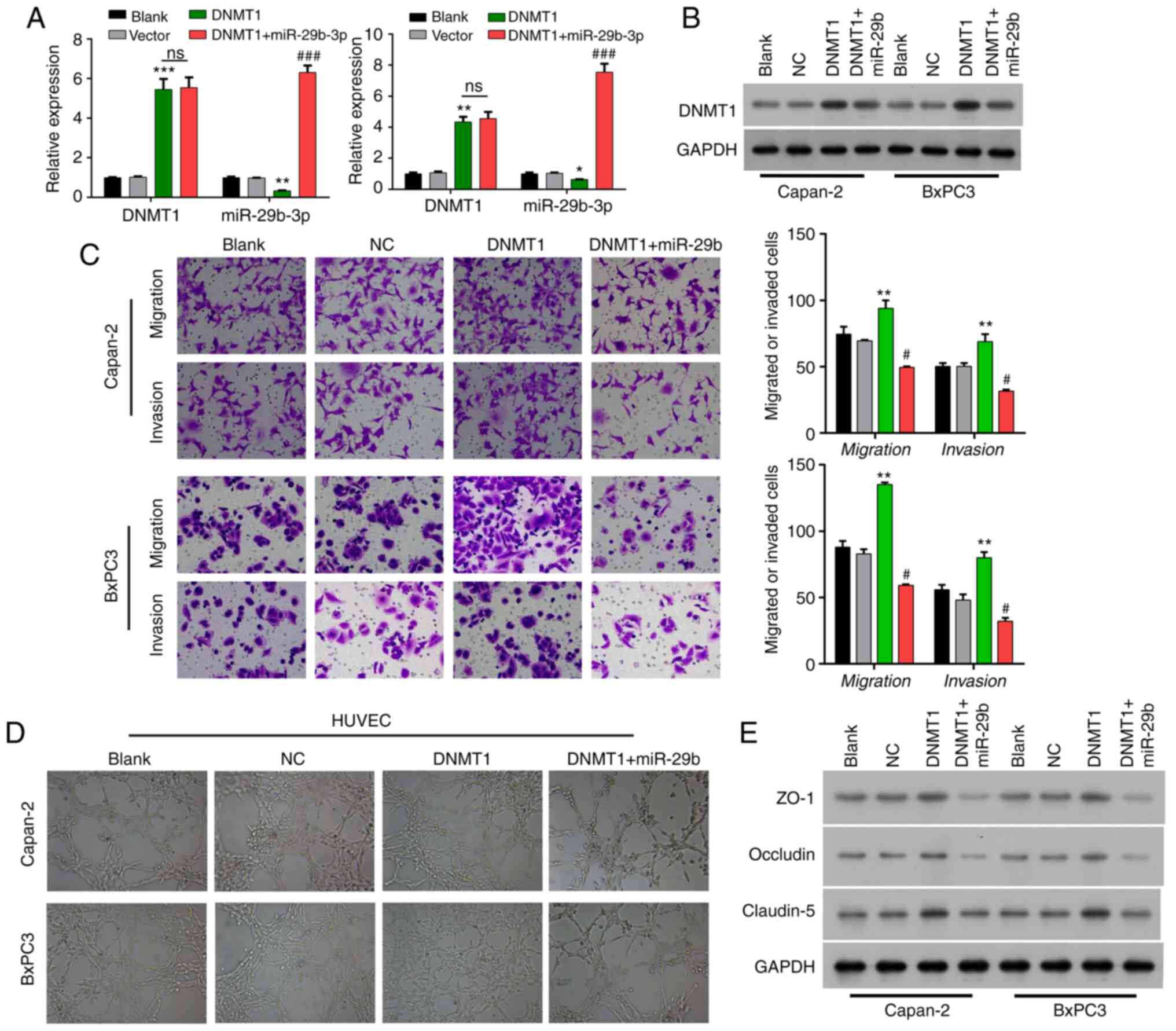|
1
|
Zhu H, Li T, Du Y and Li M: Pancreatic
cancer: Challenges and opportunities. BMC Med. 16:2142018.
View Article : Google Scholar : PubMed/NCBI
|
|
2
|
Bray F, Ferlay J, Soerjomataram I, Siegel
RL, Torre LA and Jemal A: Global cancer statistics 2018: GLOBOCAN
estimates of incidence and mortality worldwide for 36 cancers in
185 countries. CA Cancer J Clin. 68:394–424. 2018. View Article : Google Scholar : PubMed/NCBI
|
|
3
|
Bogdanović O and Lister R: DNA methylation
and the preservation of cell identity. Curr Opin Genet Dev.
46:9–14. 2017. View Article : Google Scholar : PubMed/NCBI
|
|
4
|
Zhang MW, Fujiwara K, Che X, Zheng S and
Zheng L: DNA methylation in the tumor microenvironment. J Zhejiang
Univ Sci B. 18:365–372. 2017. View Article : Google Scholar : PubMed/NCBI
|
|
5
|
Matsubayashi H, Canto M, Sato N, Klein A,
Abe T, Yamashita K, Yeo CJ, Kalloo A, Hruban R and Goggins M: DNA
methylation alterations in the pancreatic juice of patients with
suspected pancreatic disease. Cancer Res. 66:1208–1217. 2006.
View Article : Google Scholar : PubMed/NCBI
|
|
6
|
Pizzi S, Azzoni C, Bottarelli L, Campanini
N, D'Adda T, Pasquali C, Rossi G, Rindi G and Bordi C: RASSF1A
promoter methylation and 3p21.3 loss of heterozygosity are features
of foregut, but not midgut and hindgut, malignant endocrine
tumours. J Pathol. 206:409–416. 2005. View Article : Google Scholar : PubMed/NCBI
|
|
7
|
Bird A: DNA methylation patterns and
epigenetic memory. Genes Dev. 16:6–21. 2002. View Article : Google Scholar : PubMed/NCBI
|
|
8
|
Hong L, Sun G, Peng L, Tu Y, Wan Z, Xiong
H, Li Y and Xiao W: The interaction between miR-148a and DNMT1
suppresses cell migration and invasion by reactivating tumor
suppressor genes in pancreatic cancer. Oncol Rep. 40:2916–2925.
2018.PubMed/NCBI
|
|
9
|
Li A, Omura N, Hong SM and Goggins M:
Pancreatic cancer DNMT1 expression and sensitivity to DNMT1
inhibitors. Cancer Biol Ther. 9:321–329. 2010. View Article : Google Scholar : PubMed/NCBI
|
|
10
|
Xu M, Gao J, Du YQ, Gao DJ, Zhang YQ, Li
ZS, Zhang YL, Gong YF and Xu P: Reduction of pancreatic cancer cell
viability and induction of apoptosis mediated by siRNA targeting
DNMT1 through suppression of total DNA methyltransferase activity.
Mol Med Rep. 3:699–704. 2010.PubMed/NCBI
|
|
11
|
Ikegami K, Ohgane J, Tanaka S, Yagi S and
Shiota K: Interplay between DNA methylation, histone modification
and chromatin remodeling in stem cells and during development. Int
J Dev Biol. 53:203–214. 2009. View Article : Google Scholar : PubMed/NCBI
|
|
12
|
Cui J, Zhou B, Ross SA and Zempleni J:
Nutrition, microRNAs, and human health. Adv Nutr. 8:105–112. 2017.
View Article : Google Scholar : PubMed/NCBI
|
|
13
|
Lu TX and Rothenberg ME: MicroRNA. J
Allergy Clin Immunol. 141:1202–1207. 2018. View Article : Google Scholar : PubMed/NCBI
|
|
14
|
Zhao J, Dong X, Liu QC and Lu Q:
Expression of plasma miR-106a in epithelial ovarian cancer and its
diagnostic and prognostic significance. Eur J Gynaecol Oncol.
39:769–772. 2018.
|
|
15
|
Ganju A, Khan S, Hafeez BB, Behrman SW,
Yallapu MM, Chauhan SC and Jaggi M: miRNA nanotherapeutics for
cancer. Drug Discov Today. 22:424–432. 2017. View Article : Google Scholar : PubMed/NCBI
|
|
16
|
Qadir MI and Faheem A: miRNA: A diagnostic
and therapeutic tool for pancreatic cancer. Crit Rev Eukaryot Gene
Expr. 27:197–204. 2017. View Article : Google Scholar : PubMed/NCBI
|
|
17
|
Li X, Xiao J, Fan Y, Yang K, Li K, Wang X,
Lu Y and Zhou Y: miR-29 family regulates the puberty onset mediated
by a novel Gnrh1 transcription factor TBX21. J Endocrinol.
242:185–197. 2019. View Article : Google Scholar : PubMed/NCBI
|
|
18
|
Ding D, Li C, Zhao T, Li D, Yang L and
Zhang B: lncRNA H19/miR-29b-3p/PGRN axis promoted
epithelial-mesenchymal transition of colorectal cancer cells by
acting on wnt signaling. Mol Cells. 41:423–435. 2018.PubMed/NCBI
|
|
19
|
Lv M, Zhong Z, Huang M, Tian Q, Jiang R
and Chen J: lncRNA H19 regulates epithelial-mesenchymal transition
and metastasis of bladder cancer by miR-29b-3p as competing
endogenous RNA. Biochim Biophys Acta Mol Cell Res. 1864:1887–1899.
2017. View Article : Google Scholar : PubMed/NCBI
|
|
20
|
Worst TS, Previti C, Nitschke K, Diessl N,
Gross JC, Hoffmann L, Frey L, Thomas V, Kahlert C, Bieback K, et
al: miR-10a-5p and miR-29b-3p as extracellular vesicle-associated
prostate cancer detection markers. Cancers (Basel). 12:432019.
View Article : Google Scholar : PubMed/NCBI
|
|
21
|
Zhang B, Shetti D, Fan C and Wei K:
miR-29b-3p promotes progression of MDA-MB-231 triple-negative
breast cancer cells through downregulating TRAF3. Biol Res.
52:382019. View Article : Google Scholar : PubMed/NCBI
|
|
22
|
Feng L and Lou J: DNA methylation
analysis. Methods Mol Biol. 1894:181–227. 2019. View Article : Google Scholar : PubMed/NCBI
|
|
23
|
Kasai H and Kawai K: DNA methylation at
the C-5 position of cytosine by methyl radicals: A possible role
for epigenetic change during carcinogenesis by environmental
agents. Chem Res Toxicol. 22:984–989. 2009. View Article : Google Scholar : PubMed/NCBI
|
|
24
|
Przybilla J, Hopp L, Lübbert M, Loeffler M
and Galle J: Targeting DNA hypermethylation: Computational modeling
of DNA demethylation treatment of acute myeloid leukemia.
Epigenetics. 12:886–896. 2017. View Article : Google Scholar : PubMed/NCBI
|
|
25
|
Kotandeniya D, Seiler CL, Fernandez J,
Pujari SS, Curwick L, Murphy K, Wickramaratne S, Yan S, Murphy D,
Sham YY and Tretyakova NY: Can 5-methylcytosine analogues with
extended alkyl side chains guide DNA methylation? Chem Commun
(Camb). 54:1061–1064. 2018. View Article : Google Scholar : PubMed/NCBI
|
|
26
|
Yamashita K, Hosoda K, Nishizawa N, Katoh
H and Watanabe M: Epigenetic biomarkers of promoter DNA methylation
in the new era of cancer treatment. Cancer Sci. 109:3695–3706.
2018. View Article : Google Scholar : PubMed/NCBI
|
|
27
|
Van Tongelen A, Loriot A and De Smet C:
Oncogenic roles of DNA hypomethylation through the activation of
cancer-germline genes. Cancer Lett. 396:130–137. 2017. View Article : Google Scholar : PubMed/NCBI
|
|
28
|
Brancaccio M, Natale F, Falco G and
Angrisano T: Cell-free DNA methylation: The new frontiers of
pancreatic cancer biomarkers' discovery. Genes (Basel). 11:142019.
View Article : Google Scholar : PubMed/NCBI
|
|
29
|
Mishra NK and Guda C: Genome-wide DNA
methylation analysis reveals molecular subtypes of pancreatic
cancer. Oncotarget. 8:28990–29012. 2017. View Article : Google Scholar : PubMed/NCBI
|
|
30
|
Natale F, Vivo M, Falco G and Angrisano T:
Deciphering DNA methylation signatures of pancreatic cancer and
pancreatitis. Clin Epigenetics. 11:1322019. View Article : Google Scholar : PubMed/NCBI
|
|
31
|
Zhou H, Zhu Y, Wei F, Shao Y, Pan J, Wang
G, Xu K and Cheng Y: Significance of MUC2 gene methylation
detection in pancreatic cancer diagnosis. Pancreatology.
19:1049–1053. 2019. View Article : Google Scholar : PubMed/NCBI
|
|
32
|
Park JK, Ji KR, Kim YT and Yong BY: Early
diagnosis and aberrant methylation of NPTX2 gene in pancreatic
cancer. Cancer Res. 68:55142008.
|
|
33
|
Ling Z, Gao J, Li Z and Gong Y: Neuronal
pentraxin II (NPTX2) is frequently down-regulated by promoter
hypermethylation in pancreatic cancers. Dig Dis Sci. 57:2608–2614.
2012. View Article : Google Scholar : PubMed/NCBI
|
|
34
|
Singh N, Rashid S, Rashid S, Dash NR,
Gupta S and Saraya A: Clinical significance of promoter methylation
status of tumor suppressor genes in circulating DNA of pancreatic
cancer patients. J Cancer Res Clin Oncol. 146:897–907. 2020.
View Article : Google Scholar : PubMed/NCBI
|
|
35
|
Lujambio A and Lowe SW: The microcosmos of
cancer. Nature. 482:347–355. 2012. View Article : Google Scholar : PubMed/NCBI
|
|
36
|
Moutinho C and Esteller M: MicroRNAs and
Epigenetics. Adv Cancer Res. 135:189–220. 2017. View Article : Google Scholar : PubMed/NCBI
|
|
37
|
Jiang H, Zhang G, Wu JH and Jiang CP:
Diverse roles of miR-29 in cancer (Review). Oncol Rep.
31:1509–1516. 2014. View Article : Google Scholar : PubMed/NCBI
|
|
38
|
Zhao X, Liu Y, Li Z, Zheng S, Wang Z, Li
W, Bi Z, Li L, Jiang Y, Luo Y, et al: Linc00511 acts as a competing
endogenous RNA to regulate VEGFA expression through sponging
hsa-miR-29b-3p in pancreatic ductal adenocarcinoma. J Cell Mol Med.
22:655–667. 2018. View Article : Google Scholar : PubMed/NCBI
|
|
39
|
Sun Y, Wang P, Yang W, Shan Y, Zhang Q and
Wu H: The role of lncRNA MSC-AS1/miR-29b-3p axis-mediated CDK14
modulation in pancreatic cancer proliferation and
Gemcitabine-induced apoptosis. Cancer Biol Ther. 20:729–739. 2019.
View Article : Google Scholar : PubMed/NCBI
|
|
40
|
Osawa T, Takeuchi A, Kojima T, Shinohara
N, Eto M and Nishiyama H: Overview of current and future systemic
therapy for metastatic renal cell carcinoma. Jpn J Clin Oncol.
49:395–403. 2019. View Article : Google Scholar : PubMed/NCBI
|
|
41
|
Li L, Liu Z, Jiang YY, Shen WX, Peng YP
and Qiu YH: Acetylcholine suppresses microglial inflammatory
response via α7nAChR to protect hippocampal neurons. J Integr
Neurosci. 18:51–56. 2019.PubMed/NCBI
|
|
42
|
Liu D, Wang J and Liu M: Long noncoding
RNA TUG1 promotes proliferation and inhibits apoptosis in multiple
myeloma by inhibiting miR-29b-3p. Biosci Rep. 39:BSR201824892019.
View Article : Google Scholar : PubMed/NCBI
|
|
43
|
Kim DH, Kim HM, Huong PTT, Han HJ, Hwang
J, Cha-Molstad H, Lee KH, Ryoo IJ, Kim KE, Huh YH, et al: Enhanced
anticancer effects of a methylation inhibitor by inhibiting a novel
DNMT1 target, CEP 131, in cervical cancer. BMB Rep. 52:342–347.
2019. View Article : Google Scholar : PubMed/NCBI
|
|
44
|
Somasundaram S, Forrest ME, Moinova H,
Cohen A, Varadan V, LaFramboise T, Markowitz S and Khalil AM: The
DNMT1-associated lincRNA DACOR1 reprograms genome-wide DNA
methylation in colon cancer. Clin Epigenetics. 10:1272018.
View Article : Google Scholar : PubMed/NCBI
|
|
45
|
Risau W: Mechanisms of angiogenesis.
Nature. 386:671–674. 1997. View Article : Google Scholar : PubMed/NCBI
|
|
46
|
Folkman J: Tumor angiogenesis. Adv Cancer
Res. 19:331–358. 1974. View Article : Google Scholar : PubMed/NCBI
|
|
47
|
Tang X, Zhang Q, Shi S, Yen Y, Li X, Zhang
Y, Zhou K and Le AD: Bisphosphonates suppress insulin-like growth
factor 1-induced angiogenesis via the HIF-1alpha/VEGF signaling
pathways in human breast cancer cells. Int J Cancer. 126:90–103.
2010. View Article : Google Scholar : PubMed/NCBI
|
|
48
|
Zhou Y, Li S, Li J, Wang D and Li Q:
Effect of microRNA-135a on cell proliferation, migration, invasion,
apoptosis and tumor angiogenesis through the IGF-1/PI3K/Akt
signaling pathway in non-small cell lung cancer. Cell Physiol
Biochem. 42:1431–1446. 2017. View Article : Google Scholar : PubMed/NCBI
|
|
49
|
Azuma K, Suzuki S, Ishii Y, Ueda Y,
Fujikawa T, Morinaga K, Shimoyama K and Oda J: Tortuosity of the
brachiocephalic artery complicated with arterial injury after
tracheotomy: A case report. Signa Vitae. 15:77–78. 2019. View Article : Google Scholar
|
|
50
|
Zhang H, Bai M, Deng T, Liu R, Wang X, Qu
Y, Duan J, Zhang L, Ning T, Ge S, et al: Cell-derived microvesicles
mediate the delivery of miR-29a/c to suppress angiogenesis in
gastric carcinoma. Cancer Lett. 375:331–339. 2016. View Article : Google Scholar : PubMed/NCBI
|
|
51
|
Melo SA and Kalluri R: miR-29b moulds the
tumour microenvironment to repress metastasis. Nat Cell Biol.
15:139–140. 2013. View Article : Google Scholar : PubMed/NCBI
|
|
52
|
Thakar M, Hu Y, Morreale M, Lerner L, Ying
Lin W, Sen R, Cai Y, Karunasena E, Thakar M, Saggi S, et al: A
novel epigenetic modulating agent sensitizes pancreatic cells to a
chemotherapy agent. PLoS One. 13:e01991302018. View Article : Google Scholar : PubMed/NCBI
|

















